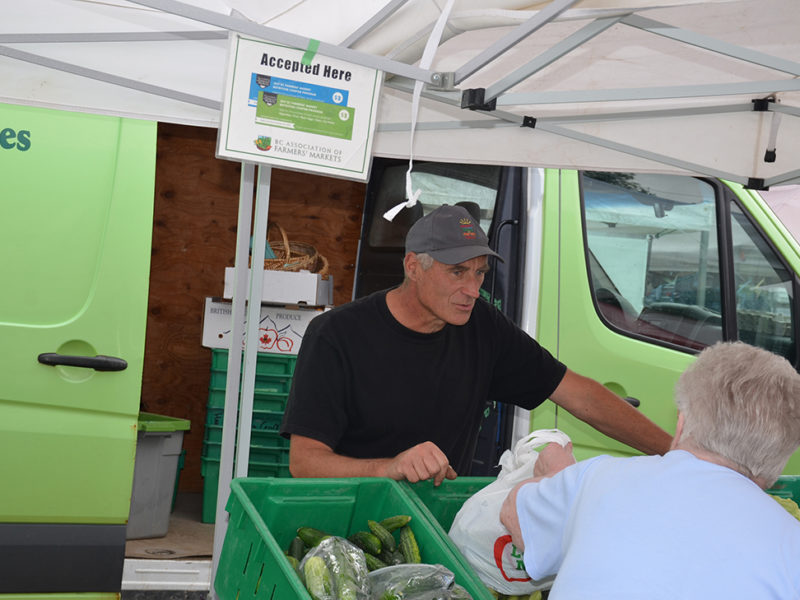VERNON – Government efforts to provide greater assurances of food safety are creating apprehension among smaller farmers regarding the additional work they will face in order to satisfy customer requirements.
Randy Irwin, corporate retail operations manager with Vernon-based Nature’s Fare Market, sums up the situation well.
“The problem with CanadaGAP is that it is government-supported but not government-operated,” he says. “And it’s not mandatory, but increasingly that is the direction it appears to be going.”
The increased emphasis on safety doesn’t sit well with Wolfe Wessel of Green Croft Gardens in Grindrod.
“Does that mean I haven’t produced any safe food for the past 30 years?” he asks. “I’m a little offended.”
Wessel, a mixed vegetable farmer, says that the amount of detailed paper work required to achieve CanadaGAP certification – about an hour each day – is simply not worth the effort unless he increases his prices. And that’s not feasible.
“There is a certain point where people will not pay more,” he says. “They will give up and go to Wal-Mart and buy a Chinese carrot.”
Wessel has sold to Nature’s Fare in the past, but he’s not sure he will be able to continue.
Nature’s Fare promotes organic, local and community. With locations across the Okanagan and the Lower Mainland, it’s in a position to source from smaller local growers.
“Local organic growers are our lifeline,” says Irwin. “We have a mandate in our produce department to source local first, regardless of the price.”
The formula has worked for the company since its founding 25 years ago, but the recent purchase of the company by Buy-Low Foods, part of the Jim Pattison Group, may bring changes.
While the company has always required its organic produce to be certified, it’s still developing a policy for CanadaGAP.
“We are currently engaging a dialogue with all of our stakeholders as we assess CanadaGAP and the other certifications which our local growers are currently involved with. We wish to continue to foster the long-standing relationships we have built with our local partners and ensure our customers have access to the very best local organic produce.”
Too detailed
John Hofer, who runs Wise Earth Farms in Kelowna with his partner Brenda Paterson, says they won’t be embracing CanadaGAP.
Wise Earth produces 35 different vegetables through the growing season. Hofer says CanadaGAP requires detailed records for each vegetable as well as each variety.
“We supply rainbow carrots as well as regular carrots, and each type requires a different set of record-keeping,” he notes.
Wise Earth could scale back the number of crops it grows, but that isn’t its business model.
Hofer says CanadaGAP is a step towards European standards that allow for maximum traceability. That’s not a bad thing, but he doesn’t think it should put undue constraints on small farmers like himself and Wessel. They shouldn’t be forced to act like large-volume, commodity producers.
“Our farmers’ market customers know us for the variety of produce that we sell,” says Hofer.
He plans to focus more on small independent stores in the Kelowna area.
“I get it if your produce is going to end up in Ontario,” he says. “But our vegetables never leave the Okanagan. … We are seeking out those that want to support local.”
BC Ministry of Agriculture food safety specialist Elsie Friesen is the province’s key trainer and a strong advocate for the program. She says CanadaGAP doesn’t necessarily limit what small producers can do.
“Ultimately, yes, the fewer the crops (or the same family of crops) makes it easier,” she says. “However, it is only the very specific items for specific crops that differ that need the extra attention.”
She said specific practices such as pesticide sprays on particular crops or fields will require separate documentation, but that’s understandable from a traceability standpoint.
“It makes it easier to do inventory accounting, and ensuring the correct pesticide was sprayed as per label requirements,” she explains.
She emphasized that growers can choose the form of record-keeping that suits them.
“It is up to the producer to decide how to keep records, as long as records are kept by which the auditor can trace the product from seeding to spraying to harvesting, and transportation to buyer,” she says.
And growers don’t have to use the forms that are provided.
“If you have an invoice from the supplier that lists the specific chemical that you purchased, you could write a spray record on the back of the invoice and a harvest date and that would be acceptable to the auditor,” she says.
“Growers need to come out to workshops,” says Friesen, who will discuss CanadaGAP at the Pacific Agriculture Show in Abbotsford at the end of January. “And they should come more than once.”


 Processing plant will cut transportation costs
Processing plant will cut transportation costs